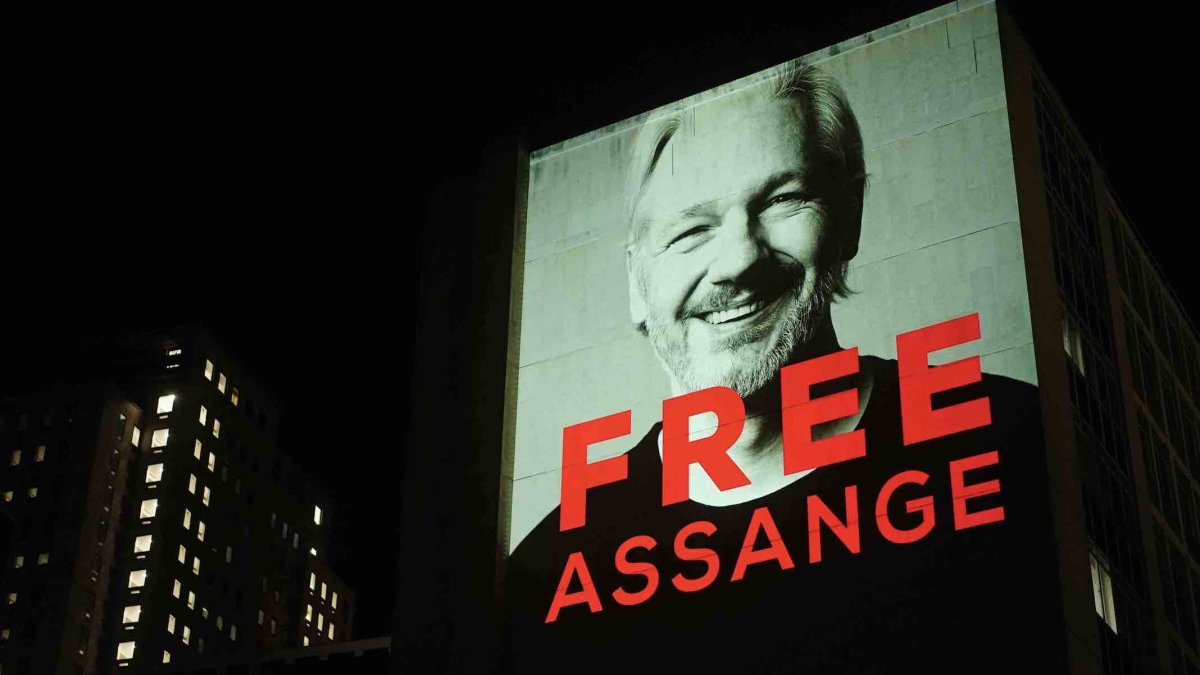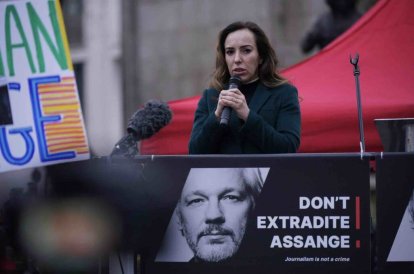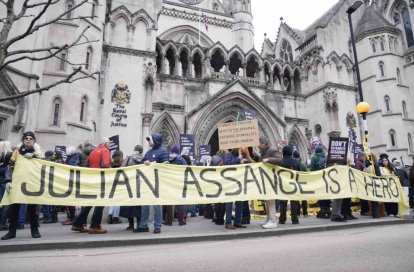Julian Assange's case explained step by step: Why is the founder of Wikileaks in the spotlight again?
During two days of hearings, Julian Assange's defense will be fighting to avoid his extradition to the United States at all costs.

Cordon Press.
Julian Assange has returned to the front pages of the world's newspapers as his appeal against extradition to the United States is being reviewed by two Supreme Court judges in a last-ditch effort to avoid what could be a life sentence.
The case of Assange, which initially polarized the United States in the uncomplicated Manichean views of left and right, has today achieved a striking syncretism. The hard right in the U.S. has aligned itself with the radical left under the same battle cry: Assange must be forgiven.
Today, in light of the trial, hundreds of people have gathered in support of Assange not only outside the Royal Courts of Justice in London but also in major cities such as Washington and New York. The voices in support are as disparate as seeing the left-wing extremist and antisemitic Jeremy Corbyn raising the same banner as the libertarian Republican Rand Paul.
Keep reading to learn the ins and outs of the Assange case and why it has once again taken over the world's headlines.

Stella Assange, the wife of Julian Assange, during a demonstration in London in favor of the journalist on February 20. Cordon Press.
How did it all start?
Julian Assange is an Australian journalist, author, and activist who, in 2006, founded Wikileaks, a non-profit media organization that became a media outlet.
In 2010, Wikileaks burst onto the scene by publishing tens of thousands of classified U.S. government documents. On July 25 of that year, major media outlets such as The Guardian, the New York Times and Der Spiegel revealed tons of sensitive information about the United States' participation in the wars in Afghanistan. The information had reached them through Wikileaks.
The information was cumbersome and did a lot of damage to the reputation of the United States. The documents distributed by Wikileaks exposed the excesses that American soldiers committed in the context of the invasion of Afghanistan: the unreported murder of hundreds of civilians, the torture of prisoners and some collaboration with the Taliban. In addition, the documents revealed details about secret meetings, upcoming military operations and strategies.
A few months later, in October 2010, Wikileaks released another batch of documents: more than 300,000 papers leaked from the Pentagon with details about the war in Iraq and U.S. operations between 2004 and 2009. In this case, the leak also exposed excesses of the American military: civilian deaths and torture. Soon after, large media outlets such as the New York Times or El País in Spain also reiterated the leaks.
The BBC classified both leaks as "the largest leaks of classified documents in history."
At first, the administration of then-President Barack Obama tried to minimize the leak.
"While I am concerned about the release of sensitive information from the battlefield that could endanger people or operations, the truth is that these documents do not reveal any issues that have not already been the subject of our public debate about Afghanistan," said Obama on July 27, 2010.
However, later, the situation became tense. The Obama administration condemned Wikileaks, arguing that the leak had irresponsibly exposed American citizens and collaborators and that it destroyed the interests of the United States.
After an intense investigation, the Obama administration concluded that Chelsea Manning, then an Army intelligence analyst, had collaborated with Wikileaks. In August 2013, Manning was convicted of multiple charges, including violations of the Espionage Act—Obama, however, pardoned her in January 2017 before leaving office.
Life in the embassy
After the leak of the documents and publication by Wikileaks, Sweden issued an arrest warrant against Assange, whom it accused of sexual assault. Assange denied the allegations, which were made by two women, and said the motivation was political. According to the journalist, who was in London at the time, the purpose was to go to Sweden so that he could then be extradited to the United States, where, Assange said, it was a matter of time before he would be charged for the leaked documents. He was imprisoned briefly until the United Kingdom granted him parole.
Faced with the sexual allegations and fearing the true motivation behind the case against him, Assange decided to take refuge in the Ecuadorian embassy in London – violating, in this way, the conditional freedom that the United Kingdom had granted him. The Swedish authorities decided to drop the charges of sexual misconduct in 2017, but nonetheless, Assange preferred to continue living in the embassy. He feared that the American Justice system was waiting for the moment he would set foot outside the building to formally accuse him and thus achieve extradition from the United Kingdom. As it turns out, that's exactly what happened.

Pro-Julian Assange protesters outside the Royal Courts of Justice in London on February 20. Cordon Press.
His jail stay
In April 2019, after seven years of refuge, Ecuadorian President Lenín Moreno expelled Assange from the embassy. The journalist was no longer a welcome guest. The measure was seen as an attempt by the Ecuadorian government to curry favor with the United States and, furthermore, as personal retaliation by Moreno, as the president had appeared in one of the Wikileaks files for an alleged corruption case.
Once outside the embassy, what Assange foresaw and feared happened: The United Kingdom immediately arrested him for violating his parole in 2012, and a few weeks later, the U.S. Department of Justice (DOJ) announced a formal indictment against Assange, whom they accused of violating the Espionage Act, participating in a criminal conspiracy, stealing secret material and 15 other crimes.
Therefore, the DOJ requested extradition for the journalist to face charges, and if convicted, he could face up to 175 years in prison.
Since leaving the embassy and up until the current day, Assange has been held in the high-security Belmarsh prison southeast of London, from where he faces a tough battle to avoid extradition.
On the verge of extradition
Initially, in January 2021, Assange's extradition was denied by a British judge, arguing that the journalist could commit suicide if he ended up in an American prison. The U.K. Supreme Court then overturned the decision, and on June 17, 2022, Priti Patel, the then-British Home Secretary, approved the extradition request. Julian Assange decided to appeal, and the trial dates were set for February 20 and 21, 2024.
It is Assange's last chance. Now, two judges of the Supreme Court will listen to both sides. First, this Tuesday, February 20, Assange's legal team presented its case against extradition. The journalist, although he was summoned, could not appear at the hearing due to alleged health problems. On February 21, the legal team of the United States Department of Justice will present its reasons in favor of extradition.
The judges will then take their time deliberating, which can range from hours to weeks, to make the final decision on Julian Assange's extradition case.
Fight for the free press?
Although Assange was initially a polarizing figure, today, there is a certain consensus that the conviction against him could have significant repercussions for journalism and freedom of expression, not only in the United States but in the world.
Disparate voices such as Amnesty International, the United Nations, or an important – and very heterogeneous – bipartisan group in the United States Congress have asked that Assange's extradition be stopped or that Joe Biden's government grant him a pardon.
A few days ago, the Australian Parliament passed a widely supported motion calling on both the United States and the United Kingdom to release Assange. Australian Prime Minister Anthony Albanese himself called for Assange's case to be "concluded" and expressed the same concern in a meeting with President Biden.
In a column in National Review, the writer Bobby Miller argues that, although he has no particular sympathy for Assange, whom he considers "an ignominious individual," "if journalists can be prosecuted for merely publishing classified information that they are in possession of, this could have a profoundly chilling effect on reporting on the inner machinations of the federal leviathan."
Miller explains that, beyond any value, freedom of the press is the axis of a Republic. Therefore, it is essential, he says, that "the Department of Justice recognizes this reality and narrows its case against Assange."

























